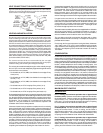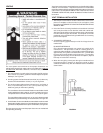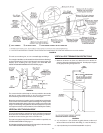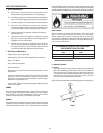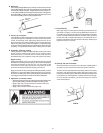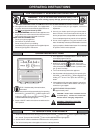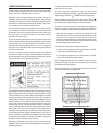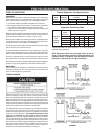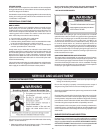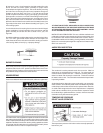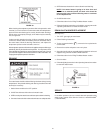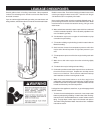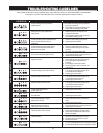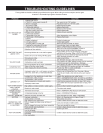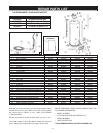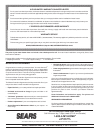
25
STRANGE SOUNDS
Possible noises due to expansion and contraction of some metal parts
during periods of heat-up and cool-down do not necessarily represent
harmful or dangerous conditions.
Condensation causes sizzling and popping within the burner area during
heating and cooling periods and should be considered normal. See
“Condensate” in this section.
OPERATIONAL CONDITIONS
SMELLY WATER
In each water heater there is installed at least one anode rod (see
parts section) for corrosion protection of the tank. Certain water
conditions will cause a reaction between this rod and the water. The
most common complaint associated with the anode rod is one of a
“rotten egg smell” in the hot water. The smell is a result of four factors
which must all be present for the odor to develop:
a. A concentration of sulfate in the supply water.
b. Little or no dissolved oxygen in the water.
c. A sulfate reducing bacteria which has accumulated within the water
heater (this harmless bacteria is nontoxic to humans).
d. An excess of active hydrogen in the tank. This is caused by the
corrosion protective action of the anode.
Smelly water may be eliminated or reduced in some water heater
models by replacing the anode(s) with one of less active material, and
then chlorinating the water heater tank and all water lines. Contact
Sears Service Center for further information concerning Anode
Replacement Kit #9001453 and this chlorination treatment. Anode
replacement and chlorination of the tank are not covered by the water
heater’s limited warranty.
If the smelly water persists after the anode replacement and chlorination
treatment, we can only suggest that chlorination or aeration of the
water supply be considered to eliminate the water problem.
Do not remove the anode leaving the tank unprotected. By
doing so, all warranty on the water heater tank is voided.
“AIR” IN HOT WATER FAUCETS
HYDROGEN GAS: Hydrogen gas can be produced in a hot water
system that has not been used for a long period of time (generally two
weeks or more). Hydrogen gas is extremely flammable and explosive.
To prevent the possibility of injury under these conditions, we
recommend the hot water faucet, located farthest away, be opened
for several minutes before any electrical appliances which are
connected to the hot water system are used (such as a dishwasher or
washing machine). If hydrogen gas is present, there will probably be
an unusual sound similar to air escaping through the pipe as the hot
water faucet is opened. There must be no smoking or open flame near
the faucet at the time it is open.
HIGH WATER TEMPERATURE SHUT OFF SYSTEM
This water heater is equipped with an automatic gas shut-off system.
This system works when high water temperatures are present. Turn
“OFF” the entire gas supply to the water heater. The high temperature
shut-off is built into the gas control valve. It is non-resettable. If the high
temperature shut-off activates, the gas control valve must be replaced.
Contact your gas supplier or Sears Service Center.
SERVICE AND ADJUSTMENT
VENTING SYSTEM INSPECTION
At least once a year a visual inspection should be made of the venting
system. You should look for:
1. Obstructions which could cause improper venting. The combustion
and ventilation air flow must not be obstructed.
2. Damage or deterioration which could cause improper venting or
leakage of combustion products.
Be sure the vent piping is properly connected to prevent escape of
dangerous flue gasses which could cause deadly asphyxiation.
Obstructions and deteriorated vent systems may present serious health
risk or asphyxiation.
Chemical vapor corrosion of the flue and vent system may occur if air for
combustion contains certain chemical vapors. Spray can propellants,
cleaning solvents, refrigerator and air conditioner refrigerants, swimming
pool chemicals, calcium and sodium chloride, waxes, bleach and process
chemicals are typical compounds which are potentially corrosive.
If after inspection of the vent system you found sooting or deterioration,
something is wrong. Call the local gas utility to correct the problem and
clean or replace the flue and venting before resuming operation of the
water heater.
BURNER OPERATION AND INSPECTION
Flood damage to a water heater may not be readily visible or immediately
detectable. However, over a period of time a flooded water heater will create
dangerous conditions
which can cause DEATH, SERIOUS BODILY INJURY,
OR PROPERTY DAMAGE. Contact
Sears Service Center to replace a flooded
water heater. Do not attempt to
repair the unit! It must be replaced!



